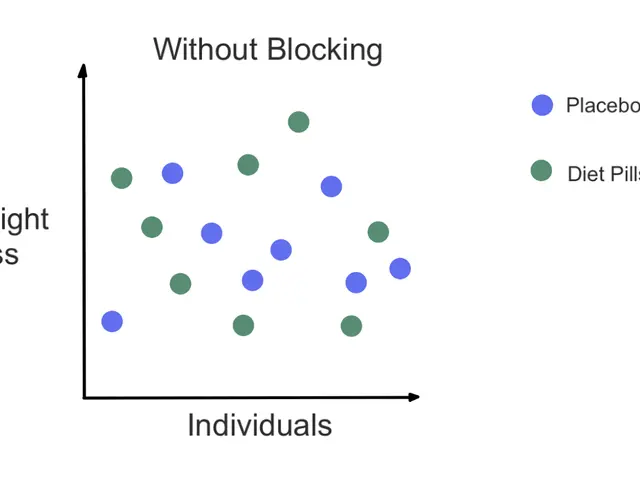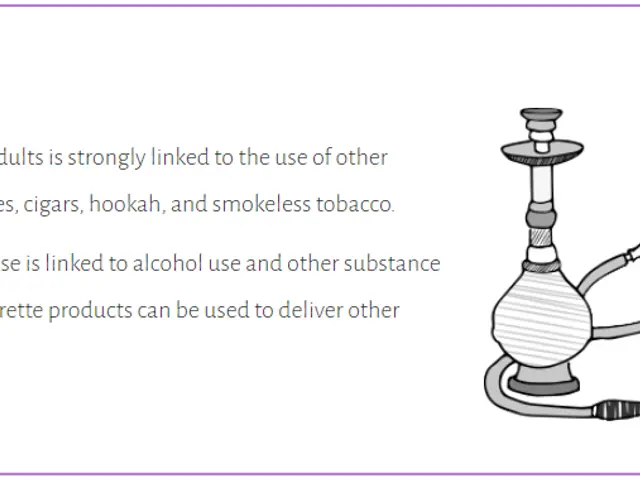Weight Loss Impacts: Is Hair Loss a Possible Consequence?
Losing your glorious mane while shedding pounds? It's no secret that rapid weight loss could potentially lead to hair loss due to stress and nutrient deficiencies. Get the lowdown on how your weight loss strategy may impact your hair's health, and what you can do to keep lush locks.
Is your hair losing its charm lately? While shedding a few strands is normal as we age, unusual hair loss could be a result of some underlying issues. If you're also losing weight, it's worth understanding if your hair loss and weight loss might be connected.
Can weight loss lead to hair loss?
Not every weight loss journey triggers hair loss, but there's certainly a link between hair loss and specific weight loss approaches such as:
- sudden or excessive weight loss
- strict dieting regimens
- protein-deprived diets
- surgical weight loss interventions
Rapid Weight Loss
Weight loss happening too fast can be associated with a condition named telogen effluvium. It's the leading cause of widespread hair loss. This condition can occur due to stress or trauma that momentarily disrupts the hair's growth cycle, causing increased shedding.
Research shows that nutrient deficiencies may also be related to telogen effluvium. However, it's essential to remember that loading up on supplements without medical guidance might aggravate the situation. Consult a healthcare professional to determine if supplements are suitable for your case.
It's good to know that telogen effluvium usually resolves within about half a year.
Restrictive and Crash Diets
If you're following a highly limiting diet for weight loss, you may inadvertently eliminate vital food groups. This can create deficiencies in critical nutrients like zinc, protein, iron, and essential fatty acids, which could contribute to poor hair health.
A study published in 2015 involving 180 women with hair loss found that iron deficiency and psychological stress were common culprits of hair loss. It seems that severe calorie-restricted diets and the stress associated with dieting can also foster nutrient deficiencies and excessive hair fall.
Optimizing your diet with a healthcare professional is advisable before starting a new diet regime. In general, focus on a balanced diet that includes a wide range of fresh fruits, vegetables, grains, and quality proteins.
Low Protein Diets
Amino acids play a crucial role in hair production, as they form the primary protein of hair called keratin. Deficiencies in specific amino acids, such as leucine, histidine, valine, and cysteine, are often observed in individuals with hair loss.
A study conducted in 2017 involving 100 people with hair loss revealed that a high number of participants had deficiencies in leucine and histidine. Deficiencies in cysteine and valine were also common. Incorporating more protein into your diet can help address this problem. Sources of protein include meat, tofu, milk, eggs, beans, quinoa, tempeh, edamame, and buckwheat.
Weight Loss Surgery
Weight loss surgery procedures like sleeve gastrectomy have been tied to low levels of essential nutrients, including protein, vitamins, and minerals. The resulting deficiencies can precipitate hair loss.
A 2018 study of 50 individuals who underwent sleeve gastrectomy found that 56% of participants experience hair loss after surgery. Furthermore, the study noted that many of these individuals exhibited low levels of vitamin B12 and zinc before and after the surgery.
How long hair loss will persist after weight loss surgery varies, but a 2021 study of 112 women who underwent sleeve gastrectomy surgery found that 72% of participants experienced hair loss following the procedure. The onset of hair loss usually began 3 to 4 months after surgery, and the majority of females saw hair regrowth within about 5.5 months.
Preventing Hair Loss after Weight Loss
Hair loss during weight loss is often influenced by rapid weight loss, stress, or nutrient deficiencies. Aim for a slow-paced and sustainable weight loss plan instead of an extremely restrictive diet. Strive for a balanced diet that incorporates all the essential vitamins and nutrients required for overall health, including hair health.
Always consult a healthcare professional before making any substantial life changes. They can help tailor a diet or supplement regimen to help stimulate hair growth.
When to Seek Professional Advice
Although hair loss itself doesn't endanger your health, it can be a sign of an underlying medical concern. Visit a doctor immediately if you notice:
- accelerated hair loss
- sudden thinning of hair
- clumps of hair falling out
- patchy or circular bald spots
tl;dr
Weight loss-induced hair loss is a common issue caused by stress, nutrient deficiencies, hormonal imbalances, or stress. The good news is that hair loss associated with quick weight loss or nutrient shortages is usually temporary, and growth can be expected within a few months after addressing the underlying causes.
If you observe that your hair is shedding or thinning abnormally, if bald patches emerge, or if clumps of your hair start to come out, consult a healthcare professional. They can help identify the cause and recommend the most effective treatment plan.
- Rapid weight loss, especially through dieting or weight loss surgery, can lead to a condition called telogen effluvium, the leading cause of widespread hair loss.
- A study of 180 women with hair loss found that restrictive dieting and psychological stress may contribute to hair loss by creating deficiencies in critical nutrients like iron and essential fatty acids.
- Low protein diets can cause deficiencies in amino acids, which are crucial for hair production, potentially leading to hair loss. Incorporating more protein-rich foods can help address this issue.




